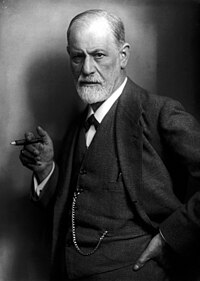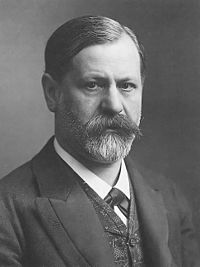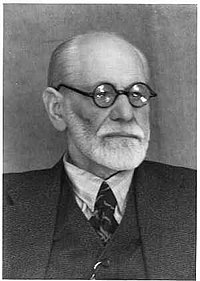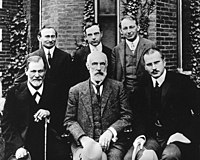
Back Sigmund Freud Afrikaans Sigmund Freud ALS ፍሮይድ Amharic Sigmund Freud AN سيغموند فرويد Arabic ܙܝܓܡܘܢܕ ܦܪܘܝܕ ARC زيڭموند فرويد ARY سيجموند فرويد ARZ চিগ্মণ্ড ফ্ৰয়েড Assamese Sigmund Freud AST
Sigmund Freud | |
|---|---|
 Sigmund Freud, by Max Halberstadt, 1921 | |
| Born | Sigismund Schlomo Freud 6 May 1856 |
| Died | 23 September 1939 (aged 83) London, England, UK |
| Nationality | Austrian |
| Alma mater | University of Vienna |
| Known for | Psychoanalysis |
| Awards | Goethe Prize Foreign Member of the Royal Society (London)[1] |
| Scientific career | |
| Fields | Neurology Psychotherapy Psychoanalysis |
| Institutions | University of Vienna |
| Influences | Aristotle, Brentano, Breuer, Charcot, Darwin, Dostoyevsky, Goethe, Haeckel, Hartmann, Jackson, Jacobsen, Kant, Mayer, Nietzsche, Plato, Schopenhauer, Shakespeare, Sophocles |
| Influenced | Eugen Bleuler, John Bowlby, Viktor Frankl, Anna Freud, Erich Fromm, Otto Gross, Karen Horney, Arthur Janov, Ernest Jones, Carl Jung, Melanie Klein, Jacques Lacan, Fritz Perls, Otto Rank, Wilhelm Reich |
| Signature | |



Sigmund Freud (Moravia, 6 May 1856 – London, 23 September 1939) was an Austrian neurologist (a person who treats the nervous system).[2] He invented the treatment of mental illness and neurosis by means of psychoanalysis.[3]
Freud is important in psychology because he studied the unconscious mind. The unconscious part of the mind cannot be easily controlled or noticed by a person.
In 1860, he and his family moved to Vienna. He did well in school and became a doctor. Freud married Martha Bernays in 1886. They had six children.[4]
Freud lived in Austria in the 1930s. After the Anschluss, Germany and Austria were combined. Because he was Jewish, he received a visit from the Gestapo. Freud and his family did not feel safe anymore. Freud left Vienna and went to England in June 1938.[5]
- ↑ Tansley A.G. (1941). "Sigmund Freud, 1856–1939". Obituary Notices of Fellows of the Royal Society. 3 (9): 246–226. doi:10.1098/rsbm.1941.0002. S2CID 163056149.
- ↑ Encyclopædia Britannica
- ↑ Hatt, Michael & Charlotte Klonk 2006. Art history: a critical introduction to its methods. Manchester University Press, page 174.
- ↑ Freud, Sigmund & Hilda Doolittle, edited by Susan Stanford Friedman. 2002. Analyzing Freud: letters of HD Bryher and their circle. New Directions, New York. page 560.
- ↑ Cocks, Geoffrey 1998. Treating mind and body: essays in the history of science, professions, and society under extreme conditions. Transaction, New Brunswick, New Jersey, page 125